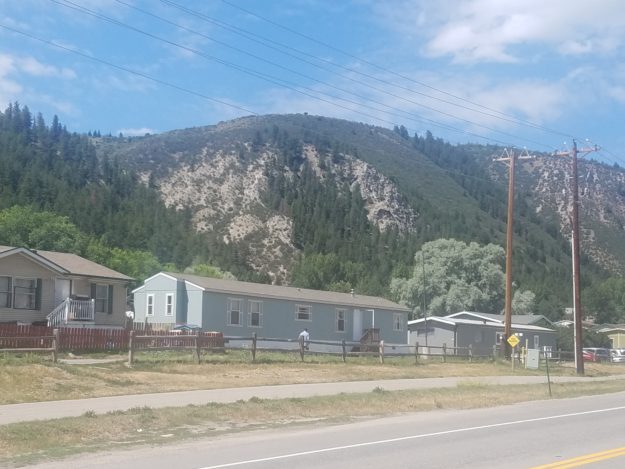Widgetized Section
Go to Admin » Appearance » Widgets » and move Gabfire Widget: Social into that MastheadOverlay zone
Is race a factor in the deal that got away at Eagle River Village?

In the first two installments for the Vail Daily of what I hope will be an ongoing series on water quality and low-income housing in the Vail Valley, I purposefully didn’t overplay the fact that the vast majority of the estimated 2,000-plus residents of the Eagle River Village mobile home park in Edwards are Latino.
My reasoning? Who cares? They’re our hardworking neighbors in Eagle County who’ve helped make this place a successful global tourism and outdoor recreation destination that benefits us all, and they deserve decent drinking water.

In my second installment that posted on the Vail Daily website on Sunday and is on the front page of the print version Monday, I focused on the collapse of a taxpayer-subsidized deal that would have helped the private owners of the trailer park – Littleton-based Ascentia – connect their property to the Upper Eagle Regional Water Authority system.
I led with local nonprofit legend Susie Davis, the former executive director of the Youth Foundation – now YouthPower365 – and current director of community impact for the recently renamed Eagle Valley Community Foundation. Davis used to live and work in the park.
I did ask her about criticism I’ve heard from some members of our community who feel the trailer park residents should feel lucky to have any kind of roof over their heads in the United States, especially if they came here illegally. In other words, shut up and drink the dirty water.
“Whether that work force is documented, undocumented, they’re a workforce and we need them,” Davis said. “So almost taking that piece out of it and saying, ‘This is what we need in a resort community; we need service workers.’”
And those service workers are human beings who deserve decent living conditions, including drinkable water. Davis confirmed the well water at the Eagle River Village mobile home park has been bad since the late 1970s when she ran a daycare facility there.
Vail Valley native Chris Jarnot, executive vice president of the Vail Resorts Mountain Division, tweeted this on Sunday: “Good reporting @davidowilliams I also can testify that the water there has been horrid since the 70’s as can all my buddies who lived there back then.”
Matt Donovan, who runs the local Vail Honeywagon trash and recycling company, posted this comment after the first part of my series on Eagle River Village went live on Friday: “Ascentia states they provide ‘The best housing value in the Valley…’ but don’t drink the water. State/County get tough! This is not a new problem.”
I appreciate these business leaders taking a stance on an issue that’s been the worst-kept secret for decades, and I know for a fact that companies like Vail Resorts and Vail Honeywagon go to great lengths to make sure they hire legal immigrants and properly documented workers.
Some companies don’t go to such lengths. Even our hardline anti-immigrant president has been caught cutting corners and benefiting from the cheap labor of undocumented workers. So anyone doing that has an obligation to take care of those workers when it comes to health, housing and basic necessities like potable water.
For those of you who say companies should pay more and quit relying on cheap immigrant labor, I agree to some extent. We have all benefited from a local economy that relies far too heavily on low-wage labor – a major exacerbating factor in our current workforce housing crisis.
But the fact is even companies paying higher wages cannot find enough U.S. citizens willing to do the jobs some members of the immigrant community are willing to take on. We have a local unemployment rate below 2 percent, and businesses are struggling to find staff, especially as the Trump administration tightens the screws on legal work visa programs.
All of this leads me to wonder whether Eagle River Village would still be operating on a poor-quality well system if our workforce had not shifted so dramatically in the 1990s from the Anglo ski bums who used to live in the trailer park to predominantly Latino residents nowadays.
Now here’s a re-post of part 2 of my series in case you missed it in the Vail Daily:
‘They’re just printing money’
Officials frustrated trailer park owners pulled out of water deal
Susie Davis personally knows just how bad the tap water at Eagle River Village mobile home park can be. The longtime Vail Valley nonprofit leader lived and worked there in the late 1970s and early 1980s, running a small childcare business.

“I think it’s deteriorated over time, but there were seasons where [the water] really had high turbidity,” said Davis, director of community impact for the recently renamed Eagle Valley Community Foundation. “You turned on the water and looked at it and said, ‘I’m not going to drink that.’”
More than a half dozen residents of Eagle River Village on the west end of Edwards, speaking on the condition of anonymity out of fear of retaliation from ownership and management, recently told the Vail Daily the well water at the park is undrinkable.
But Davis can attest to the fact the problem has been going on for decades. She used to market her childcare business by telling families she used bottled water because the poor state of the well water was well-known, even back then. Forty years later, many of the estimated 2,000 people living in the park still have to buy expensive bottled water for drinking and cooking.
That’s why Davis, whose organization runs a free food bank and would rather that park residents spend their money on nutrition, was so disappointed this past spring when a painstakingly crafted deal to connect the trailer park to the local water system fell through.
The framework of the deal
The deal would have required Eagle River Village owner Ascentia, a Littleton, Colo.-based real estate holding company that owns five other parks across the state, to pay $500,000 up front and $365,000 a year for 10 years in a low-interest loan to connect to the Upper Eagle Regional Water Authority system. That investment, plus about $600,000 of Ascentia’s existing water rights, represented a little over half the overall $4.4 million cost of connecting to the system.
The other nearly $2 million would have been covered by Eagle County dedicating $1.2 million in water rights from the Eagle Park Reservoir, a $500,000 impact investment from the Community Foundation and $200,000 from the water authority foregoing an annual rate adjustment. The water authority had also agreed to finance $1.4 million in impact fees at 3-percent interest.
In total, the $4.4 million cost of connecting to the UERWA system is comprised of that $1.4 million in impact fees, $2.5 million in water rights and $500,000 in engineering and hookup costs. Residents would have been required to pay an additional fee, which one proposal put as low as $25 a month. Residents say they pay as much as $75 a month for bottled water.
Negotiations on the deal that fell through first started in June of 2018, and in August of last year – according to emails obtained by the Vail Daily – Ascentia Vice President of Asset Management Marko Vukovich agreed the company would spend the $500,000 up front and then pay an additional $300,000 a year for 10 years.
During negotiations, that annual amount increased to $365,000 a year, or an additional $650,000 over 10 years. Asked if those additional costs caused the company to pull out of the deal in April of this year, Vukovich would not say.
‘Needed components did not materialize’
“Last summer representatives from the community approached us with a conceptual
proposal to tie into the district water system,” Vukovich said. “After several
months of collaboration, the needed components of this concept did not
materialize and we were not able to move forward with it.
“The consistent response from our residents was that they were not in favor of tying into district water because of the financial implications associated with a new system,” Vukovich added.
But numerous current residents told the Vail Daily they were not aware of any potential deal to connect to the water system – nor were they surveyed on their willingness to help pay for it.
“If they would have not pulled out of the deal and they would have asked for everyone’s opinion, I think it would have been a good thing to do for the community, because I’m sure I’m not the only one allergic to the water,” said one resident who gets skin rashes from bathing in the water.
“They raise [land lease rates] up every year anyways by like a hundred bucks,” the resident added in reference to monthly rates of around $1,200 to park a mobile home on Ascentia property. Nearly 90 percent of the residents own their trailers but have seen lease rates steadily climb over the years.
Financial analysists familiar with the proposed tie-in deal say Eagle River Village is Ascentia’s flagship property in its seven-state portfolio, grossing more than $5 million a year based on 381 mobile homes paying an average of around $1,200 a month in land leases.
“We did not get far enough along in the tie-in process to warrant notifying our residents. The feedback which we did receive however was primarily unsolicited, yet clear and consistent,” Vukovich said. “The hope was to find an arrangement that would benefit the residents, the county, and the ownership group. Ultimately, we were not able to make that happen.”
State health officials say there have been some minor administrative violations with the well-water system at the park, and one elevated lead finding in 2014 that has since been addressed. Overall, they say the water at the park may have “aesthetic” problems but that it meets state standards under the federal Safe Drinking Water Act.
State officials say they will again reach out to Ascentia and offer water system “coaching” to try to improve the aesthetic quality of the water at Eagle River Village but that they need the cooperation of the owners. Vukovich said the company is open to the state assistance.
The Vail Daily tried unsuccessfully several times to get a comment on the situation from former Eagle County commissioner and Edwards resident Jill Ryan, who is now executive director of the state agency that oversees water quality – the Colorado Department of Public Health and Environment. The county defers to the state on water-quality regulations.
‘They’re just printing money’
“From a county standpoint … we want every resident in this community to have access to adequate resources to be healthy and thrive, and that’s why we’ve worked so hard with the Community Foundation and others to find a way to bring in some of the best water in the world to that community …” said Chris Lindley, the outgoing director of Eagle County Public Health and Environment.
Lindley expressed frustration that Ascentia pulled out of a deal that included significant public funding for a highly profitable private business.
“Yeah, it’s a massive subsidy,” Lindley said of the deal Ascentia rejected. “They’re just printing money. It’s unbelievable.”
The park houses seven percent of the county’s overall Eagle River Valley population, and they’re mostly low-income service workers who are critically needed in a county with an unemployment rate under 2 percent.
“It just continues to exacerbate the financial burden that’s already on them for just being up here in this community where housing is so expensive,” Lindley said of the added economic and health burden of bad water.
Eagle Valley Community Foundation’s Davis, whose nonprofit runs a food bank warehouse in Gypsum and mobile markets with free food throughout the Vail Valley, considers good drinking water a basic necessity for every resident of Eagle County.
“Should our tax dollars be paying for this? Well, we pay for affordable housing, or we try to,” Davis said. “So this really comes down to this is our civic responsibility to make sure that our service workers, our employment base has potable water. That just seems like a given.”
She, too, is frustrated the deal fell through.
“I know as a private property owner you don’t want somebody to come in and take your water rights away,” Davis said. “At the same time, we’re just talking about having water. This is a first-world country in an incredible resort community, and we can’t guarantee potable water for everybody.”
One former resident of the trailer park had heard about the deal falling through and wasn’t surprised Ascentia pulled out. For many years she felt public officials ignored the situation.
“Now they’re trying to do something,” she said. “It’s just that the owners and the management just want the money and they don’t want to spend the money because they’re used to not doing anything for the residents.”
Editor’s note: This is part 2 of an ongoing series on water-quality issues in Eagle County. Click here to read part 1.
David O. Williams
Latest posts by David O. Williams (see all)
- Immigrant rights groups push Colorado AG Weiser for probes into violations of ICE collaboration law - July 11, 2025
- First ever Habitat for Humanity homes craned into Vail as ski town tries to tackle acute housing crisis - July 9, 2025
- ‘Now we have to look at that’, Colorado AG Weiser says of challenging Trump’s energy emergency - July 8, 2025


